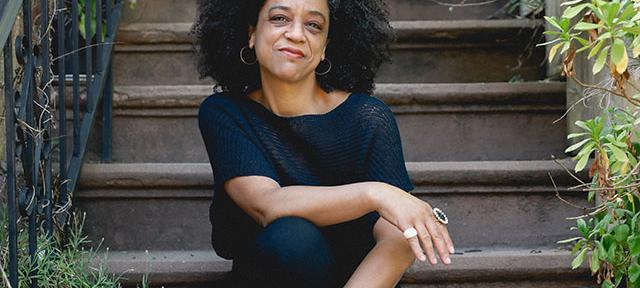Alum Rebecca Carroll on Her New Memoir 'Surviving the White Gaze' and the Power of Storytelling to Reshape Language

Carroll is a cultural critic, author, journalist, and the host of the podcast Coming Through with Rebecca Carroll, a series of 15 conversations about race that launched last year.
Hampshire College alum Rebecca Carroll 89F’s new memoir, Surviving the White Gaze, traces Carroll’s experiences growing up in an all-white family and her struggle to fully claim her identity as a Black woman. Carroll is a cultural critic, author, journalist, and the host of the podcast Coming Through with Rebecca Carroll, a series of fifteen conversations about race that launched last year.
We recently sat down (virtually) with Carroll to discuss her memoir, the power of conversation to shape language, and how Black writers can reclaim Black stories.
You're an author, journalist, and podcaster, and you've worked in television, as well. Do you have a favorite communication medium for certain types of stories?
I think of myself first as a storyteller and a collagist. I love to find places for voice to really be at its most and best amplified. Podcasting was not something I had really done until five years ago, but I’ve found it to be such a delightful medium and muscle. It is also so germane to Black folks and Black history and oral tradition, which I felt like I had been trying to celebrate and uphold in my books. There’s this challenge of only having somebody's ear, and you have to create a world with that. So I just fell in love with that medium and that challenge.
Having said that, I'm an extremely visual person. I have a vivid memory and a cinematic sense of the world, so I'm really excited to work on the adaptation of the book, which I'm going to be creating for a limited TV series with Killer Films and MGM/TV. I love to discover new ways to tell stories.
Why do you feel that storytelling is such a powerful way of communicating?
I would go back a little bit and say my favorite kind of storytelling is the kind that builds language in real time. And that's a conversation, right? I'm so drawn to interviewing and being in conversation with people because you're having this experience of building language—and I think that's the only way that we change our brains. It's the only way that we evolve as human beings.
And because my wheelhouse, for lack of a better word, is race and Blackness and womanness and Black womanness, it's a really important tool for me to be able to use conversation, storytelling, and language as a way to change how we think and feel about race specifically.
In your book, you recall your friendship with poet and playwright Ntozake Shange and how she was quoted as saying she wrote for “young girls of color, for girls that don’t even exist yet, so that there is something there for them when they arrive.” Did you have an audience in mind for this book?
I mean, the first audience had to be me—it had to be little me and me at every stage that I write about in the book because I was so influenced by Ntozake Shange and Toni Morrison and Audre Lorde, and Toni Morrison said to write the book that you want to read. I felt like I was sort of sharing these memories with myself at every stage of the way just to console her. But if the book does this well, I think it can have a really broad reach.
In your essays and opinion pieces, you’ve written about subjectivity and objectivity quite a bit before. How did those questions influence the writing of your memoir?
I couldn't possibly have told or written this memoir until I was in full agency of my story and my truth, and had the emotional fortitude to stand behind it. The other thing is that I realized that a couple of different things can be true at the same time; I know something to be true, and someone is disagreeing with me. I think that I wouldn't have believed or agreed with that in my 20s, or even my early 30s, but I don't feel that way anymore because, clearly, I had this experience [that I write about]. I feel as though when we're talking about our own personal truths and experiences, we have to interrogate our memories really rigorously. And when we are receiving people's response to that, we have to meet it with a kind of radical compassion, while also really standing firm in who we are and what we believe.
You wrote a really powerful piece in the Columbia Journalism Review about how journalistic objectivity is often conflated with whiteness. We’ve seen that same critique applied to academic disciplines as well. What would you say to BIPOC students who want to push back on these false objectivities?
I would say that you just have to call it out. You have to find an ease, a comfort, and a kind of grace that you give yourself to call something out that is untrue and unfair and unjust that does not have to be. And it's funny you're asking about this because I learned this at Hampshire, actually. So, I will say to folks at Hampshire that you show up the way you want to show up, find the people who are going to support you in that, and find the ease in that.



